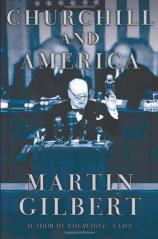Churchill and America
Review
Churchill and America
President John F. Kennedy once famously lauded Winston Churchill as
the man who "mobilized the English language and sent it into
battle."
That deed is the central idea that leaps from the pages of Martin
Gilbert's CHURCHILL AND AMERICA, a documentary study of Churchill's
lifelong involvement with the homeland of his own mother, the
wealthy and well-connected Jennie Jerome of New York City.
Gilbert, who was appointed Churchill's "official biographer" (by
whom appointed is not specified) has written or edited at least
seven volumes on Churchill himself as well as a number of others on
related aspects of World War II. Judging by the large number of
source-note citations in this book, he has recycled a fair amount
of material from his earlier output. Can Gilbert finally have
reached the point where there is nothing new left to say about the
great English wartime leader?
The core of Gilbert's story, of course, is the close wartime
collaboration between Churchill and President Franklin D.
Roosevelt, a partnership that, it could be plausibly argued, saved
the west from Nazi conquest. The documents that Gilbert reprints
show that, beneath the public surface of mutual admiration and
close cooperation between the two, there lay a substratum of
suspicion, doubt and wily tactical maneuvering.
They genuinely liked each other, but beyond that each man was
looking out for his own country's interests first. During the dark
days when Britain fought the Nazis alone while powerful interests
in the US fought against American involvement, Churchill told his
son forcefully, "I shall drag the United States in." An aide once
recorded him saying that "no lover ever studied every whim of his
mistress as I did those of President Roosevelt."
This whole wartime story has been told often before, of course.
Gilbert's method relies heavily on documents --- telegrams,
diplomatic dispatches, diaries, memoirs. This gives his book a
certain stenographic quality, but the central drama remains as
vivid as ever.
The book is also filled with examples of Churchill's masterly prose
style, which could make the most routine of matters readable and
interesting. When he and FDR disagreed over the length of one of
their wartime meetings, Churchill told him that five or six days
was too short a time --- "even the Almighty took seven."
The reader is also reminded of Churchill's remarkable prescience
--- his ignored early warnings about both the Hitler menace and the
Communist threat, his feeling that rejection by the US of
participation in the League of Nations after World War I was a
catastrophic mistake that led inevitably to World War II.
During his long life Churchill visited the US a total of 16 times,
first as a 20-year-old lecturer, lastly as an out-of-office
85-year-old. From the very beginning he saw America with a clear,
discerning eye and a sharp pen, producing shrewd character sketches
of those he met, marveling at what this country had become yet
distressed by its brashness. He was appalled by the length and
superficiality of American elections, announcing once with typical
wit that "for the next nine months the Americans will be amused by
their election campaign." One wonders what he might say on that
subject today.
Despite his reservations, one of his great lifelong passions was
for close cultural -- but not, of course, political -- union of the
two nations, whose common destiny he saw as nothing less than a
mission to preserve civilization.
It really does not matter how much scissors-and-paste Martin
Gilbert used to assemble this book. It is still a grand and
historically compelling story. It is here told without much
literary flair --- but when you have Winston Churchill as your
co-author, even 40 years dead, you need not worry too much about
that.
Reviewed by Robert Finn (Robertfinn@aol.com) on December 27, 2010
Churchill and America
- Publication Date: October 4, 2005
- Genres: History, Nonfiction
- Hardcover: 528 pages
- Publisher: Free Press
- ISBN-10: 0743259920
- ISBN-13: 9780743259927




